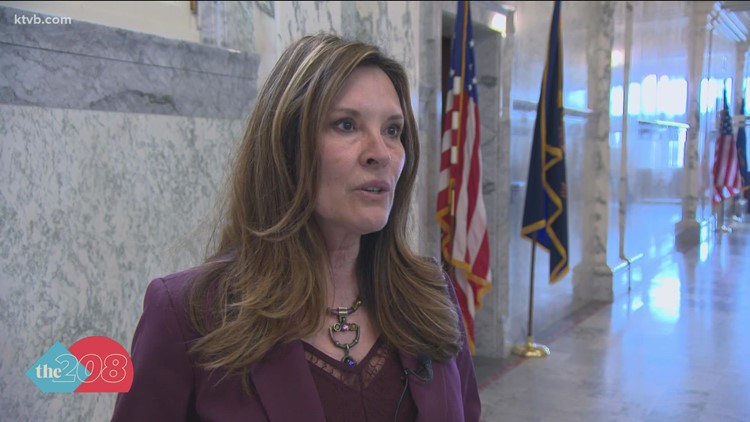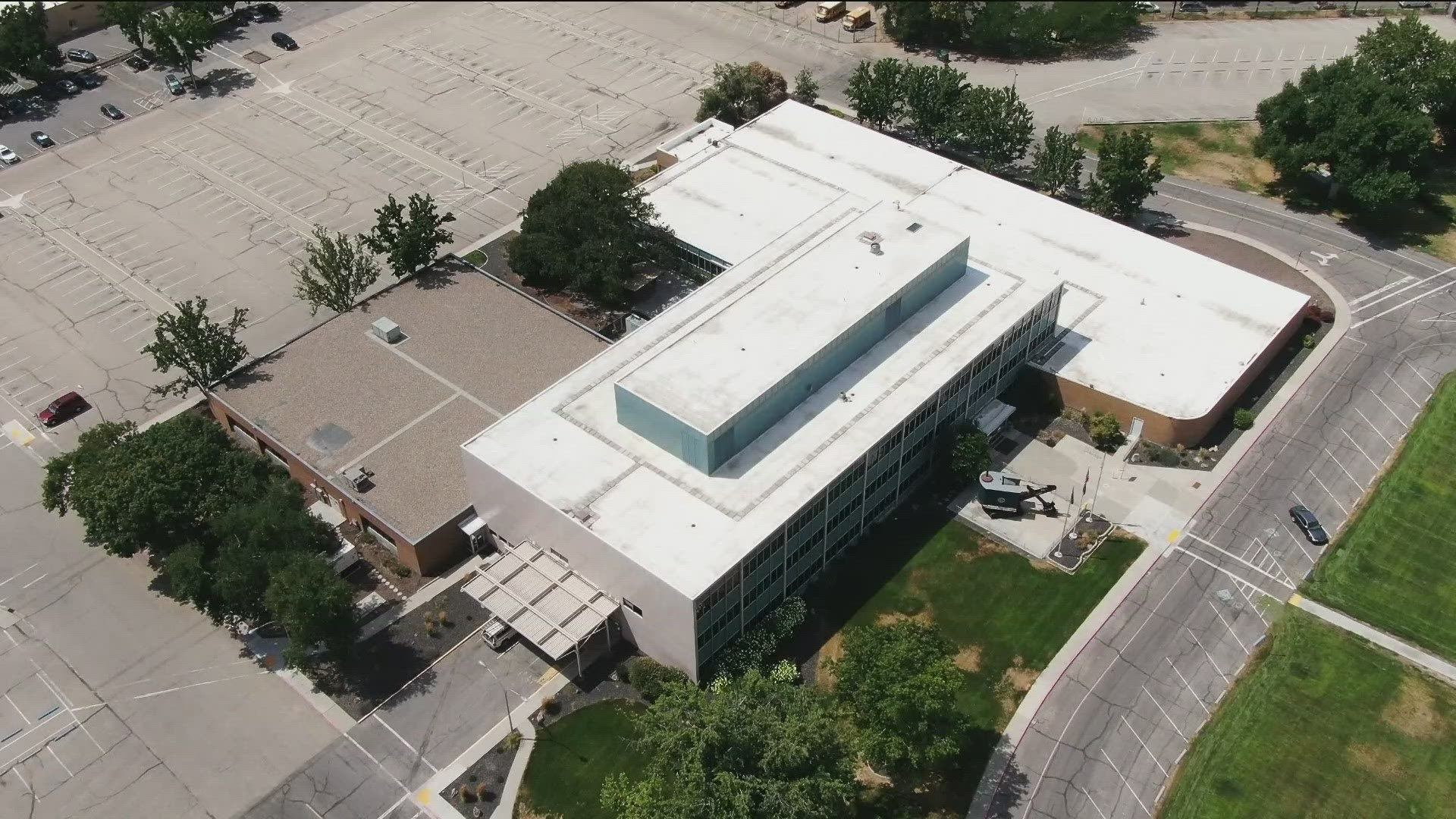BOISE, Idaho —
This story originally appeared in the Idaho Press.
Idaho Lt. Gov. Janice McGeachin, who is running for governor, called on Gov. Brad Little Monday to call a special session of the Legislature to remove the three exceptions in Idaho’s current “trigger law” banning abortion, saying she wants to “make Idaho a state where life is fully and unconditionally protected.”
Idaho’s current law, enacted in 2020, would take effect 30 days after the U.S. Supreme Court overturns its 1973 Roe v. Wade decision legalizing abortion. It would make abortion a felony in Idaho, with exceptions only to save the life of the mother, or for cases of rape or incest that had been reported to police and documented with a police report submitted to the doctor.
McGeachin, in a press release from her campaign, called the current trigger law “insufficient, containing numerous exceptions and carve-outs.” She said, “No child should ever be murdered because of the circumstances surrounding his or her conception.”
McGeachin’s call drew immediate objections from both sides of the abortion debate on Monday, with abortion rights backers calling it “unthinkable,” and anti-abortion activists saying Idaho’s trigger law already is the strongest in the nation.
“Idaho is already positioned to outlaw almost all abortions in this state,” anti-abortion activist David Ripley, head of Idaho Chooses Life, the group that spearheaded the 2020 trigger law, wrote in an email to Little’s office on Monday. Ripley said there’s “absolutely no need to hold a special session of the Idaho Legislature. In fact, such an event could only pose a threat to the pro-life gains we have already painfully won.”
House Assistant Minority Leader Lauren Necochea, D-Boise, reacted with shock to McGeachin’s position, calling it “deeply disturbing.”
“It is unthinkable to force the continuation of a pregnancy with life-threatening complications,” Necochea told the Idaho Press. “And we should never force childbirth upon a victim of rape or incest, or anyone else.”
“The supposed exceptions in statute for rape and incest are already insufficient,” Necochea said, “and are going to be very hard for most victims to navigate, because most victims of rape and incest do not file a police report. It’s my understanding that it’s also not common for police reports to be released mid-investigation.”
The trigger law, SB 1385, passed in 2020 with no Democratic support in either house; its lead sponsors were Sen. Todd Lakey, R-Nampa, and Rep. Megan Blanksma, R-Hammett. It had 30 GOP co-sponsors; Little signed it into law on March 24, 2020.
Asked whether she opposes all exceptions to banning abortion in Idaho, including to save the life of the mother, McGeachin issued this statement through her campaign: “I believe that life begins at conception, and no child should be killed because of the circumstances surrounding his or her conception. Of course I understand that there are rare medical emergencies in which it may be impossible to save the life of both the mother and the child. In such rare occurrences, a difficult decision may have to be made, but Idaho law must never allow for elective abortion masquerading as medical necessity.”
Rep. Brent Crane, R-Nampa, who has advocated for and sponsored anti-abortion legislation in the state Legislature, said Monday that he’d oppose any special session on the matter. “I think you’re getting the cart before the horse, and you need to make sure that you are on strong legal footing before the Idaho Legislature moves forward with respect to anything dealing with abortion. The court needs to weigh in,” he said.
The recently leaked draft opinion showing a majority of the U.S. Supreme Court is prepared to overturn Roe v. Wade has prompted a political furor, but Crane said Idaho already has “a pretty restrictive trigger law.”
“It is a very emotional and highly sensitive issue,” he said.
Crane raised eyebrows around the state on Friday when both he and Necochea appeared on Idaho Public Television’s “Idaho Reports” and discussed the fallout from the leaked high court decision in Idaho. Asked whether he’d hold hearings on additional legislation in the House State Affairs Committee, which he chairs, Crane said he’d consider holding hearings on proposals to ban emergency contraception, such as Plan B, which is a legal, over-the-counter medication, and that he was undecided on whether or not he’d allow hearings on a proposal to ban IUD’s, a long-approved, long-lasting form of contraception.
Crane said Monday that once he gave more thought to the question, he wouldn’t hold hearings on a proposal to ban IUD’s, though he would on Plan B. “I think it’s a question the committee probably needs to wrestle with,” he said, “where do we draw that line.”
Necochea said, “I was shocked to hear that different kinds of contraception could also become outlawed in Idaho. This shows that overturning Roe v. Wade is just the beginning, and that Republicans are going to be looking at curtailing all different kinds of reproductive rights.”
“There have been relentless attacks on our rights to make the most intimate, personal decisions, and the trajectory of these attacks shows a continual move to the most extreme positions,” she said. “This is consistent with the right wing of the Republican Party, and unfortunately, the Republican Party as a whole is moving in that direction.”
She added, “We know Idahoans are using contraception so they can plan healthy pregnancies. They need to be able to continue to do so.”
Crane noted that the current trigger law includes restrictions including that when an abortion is performed to save the life of the mother, “the doctor has to make every reasonable attempt to save the life of the child.” Ripley called it “the best trigger law in the nation.”
In addition, the law forbids doctors from finding that the mother’s life is in danger from suicide. It doesn’t include any exceptions for cases where the mother’s health, but not her life, is threatened.
Crane said he didn’t know if the Idaho Legislature would consider amending its trigger law to ban all abortions with no exceptions. “I want to wait until the court makes their decision, I want to let Idaho’s trigger law go into effect and see how it would work, and go from there,” he said. “Rushing forward I don’t think is wise.”
At her “Rally the Vote” event at Kleiner Park in Meridian last week, McGeachin told the audience, “I’m not afraid to say that in Idaho we need to unconditionally prohibit abortion, and as your governor, this will be one of my top priorities.”
This story originally appeared in the Idaho Press. Read more at IdahoPress.com
Watch more Idaho politics:
See all of our latest political coverage in our YouTube playlist:



